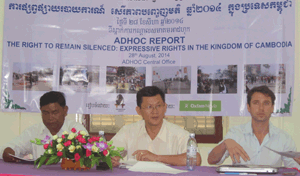ADHOC Reparations Workshop in Kampot on June 17, 2009
Survivors of the Khmer Rouge regime attended a workshop on the subject of ECCC reparations last Wednesday, 17 June 2009, in Kampot. Of the 112 victims in attendance, 95 have applied to be civil parties for Case 002. ADHOC organized this workshop with support from the European Union, Oxfam Novib, and the DED.

Thun Saray introduced the discussion of moral and collective reparations, and, in particular, “what they might look like for the Khmer victims…We will collect and document the suggestions that you propose today and send them to the ECCC for the judges to consider.”
Kaisie Neou affirmed the importance of civil party participation. “My role is to help communicate your ideas and needs to the Court and ADHOC is helping in this…[t]oday, we want to hear your suggestions. We cannot provide individual reparations for 14 million people. Even if we only gave each victim $1, that would cost $14 million. And what could you do with only $1?…Collective reparations must benefit the entire community.”
Christoph Sperfeldt described the various reparations that have been given by other international criminal tribunals to the victims. He emphasized the importance of the victims’ central role in recommending to the court what forms the collective and moral reparations should take: “The question that we have to ask is, ‘What will bring justice for the victims of the Khmer Rouge?’…justice is not only punishment [for members of the KR regime]; justice is also actions that can be taken on behalf of the victims to help them because of what they suffered.” He described different forms of reparations that help victims to understand the truth about what they suffered, to document and preserve the memory of the past, to publicly acknowledge that history, and also to aid victims in the process of recovery and helping them to rebuild their lives.
Som Vireak, counselor and trainer from Transcultural Psychosocial Organization (TPO), explained that, “[w]hen you have access to justice through the ECCC, even if it’s not 100%, it can help to give you peace of mind. When you see Duch on TV, it may make you angry,…but when you see him apologize and admit what happened in Tuol Sleng, it can be helpful. You may feel better when you hear the real story.”
After group discussions, the civil parties presented their suggestions for moral and collective reparations. The main suggestions were for hospitals and health care for the elderly and those who suffer psychological trauma. Each group also requested a museum or library for preserving documents and evidence from the Khmer Rouge years and also for educating the public and future generations. Other suggestions included a statue depicting Pol Pot in handcuffs, national remembrance holidays, and the construction of schools, memorials, and stupas dedicated to the victims of the Khmer Rouge.
Throughout the day, the civil parties also asked the speakers many questions about Case 001, and some voiced their frustrations with how long the trial is taking. Many, however, affirmed that they want the trial to be successful and hope that it will reveal the truth about the Khmer Rouge regime once and for all.

